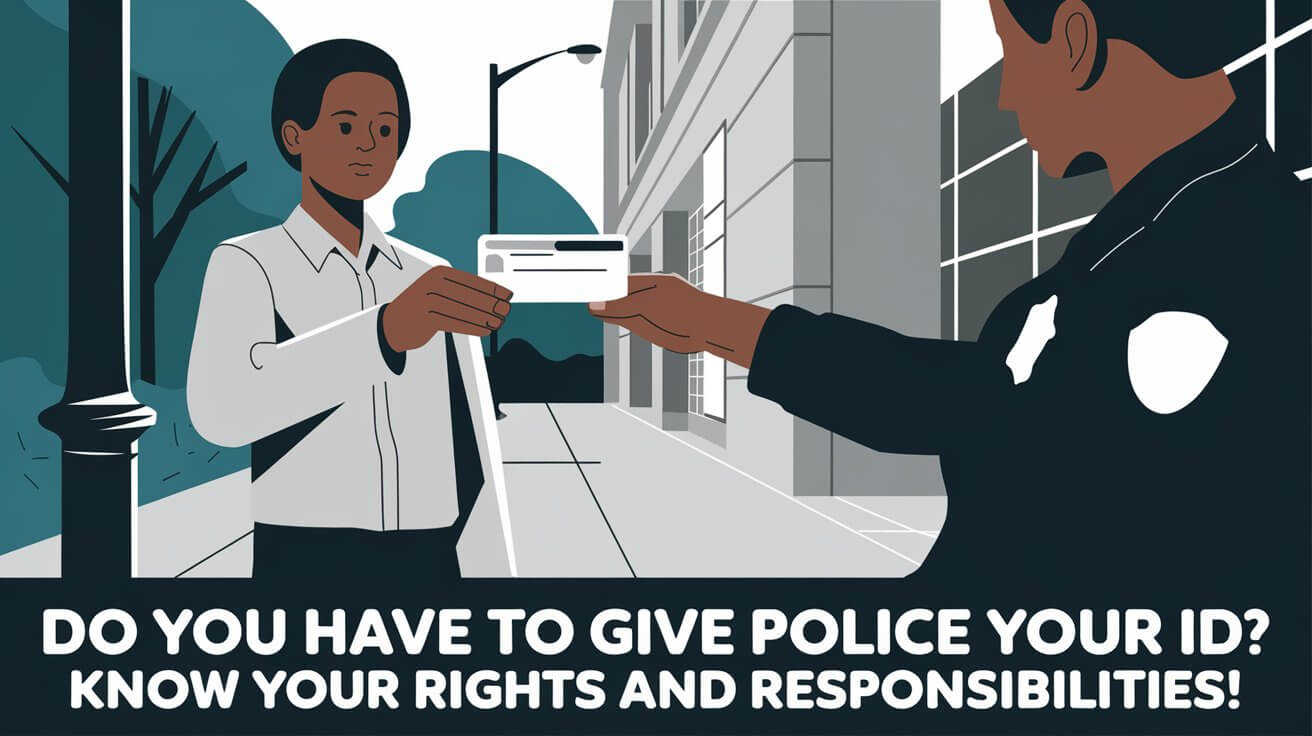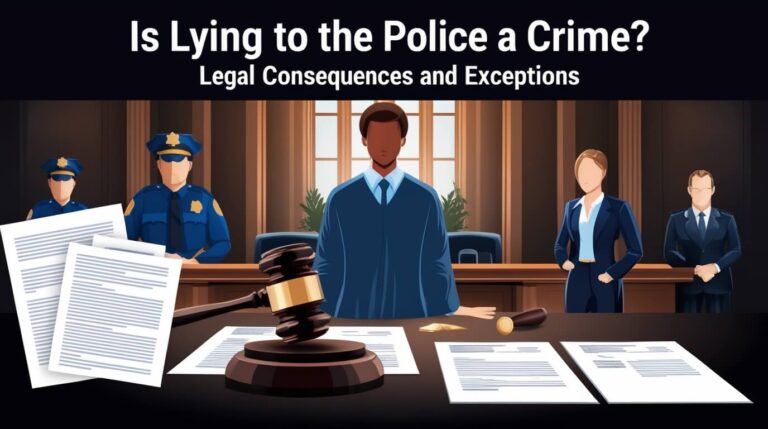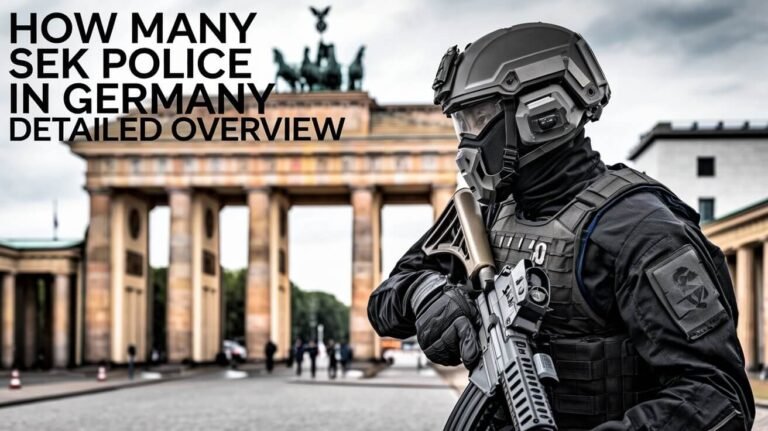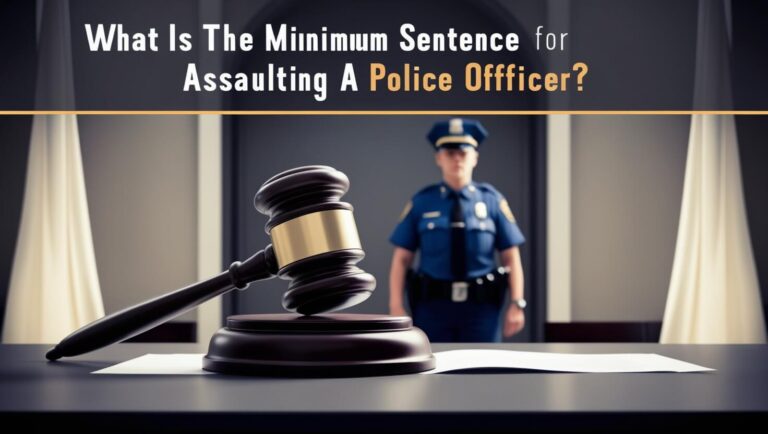Do You Have to Give Police Your ID? Know Your Rights and Responsibilities

Police asking for ID can be tricky. You don’t always have to show it. It depends on where you are and what’s happening. This guide explains when you must give ID and when you can say no.
Knowing your rights helps in these tense moments. We’ll talk about the laws behind ID checks, what you can do when stopped, and times when ID might be needed.
With this info, you’ll feel more sure of yourself when dealing with police. You’ll learn how to stay safe and follow the law at the same time.
Police ID Requests
When Can Police Ask for ID?
Police can ask for your ID at any time. But asking doesn’t mean you always have to comply. The key is understanding the difference between a request and a legal requirement.
Officers might request ID during:
- Routine patrols
- Traffic stops
- Investigations
- Suspicious activity reports
Just because they ask, doesn’t mean you must show ID. Your response depends on the situation and local laws.
Legal Basis for ID Requests
Police need reasonable suspicion to demand ID in most cases. This means they must have specific, articulable facts that suggest criminal activity. Hunches or generalizations aren’t enough.
Examples of reasonable suspicion include:
- Matching a suspect description
- Being in a high-crime area late at night
- Behaving suspiciously near a recent crime scene
Without reasonable suspicion, you often have the right to refuse an ID request.
Difference Between Request and Demand
A police request for ID is different from a demand. When an officer asks, “Can I see some ID?” you can usually decline politely. A demand, however, often comes with legal consequences if you refuse.
Listen carefully to the officer’s words. “I need to see your ID” is different from “Would you mind showing me some ID?” The first is a demand, while the second is a request.
Your Rights During Police Encounters
The Right to Remain Silent
You’ve heard it in movies and TV shows, but it’s real: you have the right to remain silent. This applies to ID requests too. If you’re not legally required to show ID, you can politely decline.
Try saying:
- “I don’t wish to provide ID at this time.”
- “Am I legally required to show ID?”
- “I’d like to exercise my right to remain silent.”
Remember, staying calm and respectful is key.
Freedom of Movement
In many cases, you’re free to leave a police encounter. Always ask, “Am I free to go?” If the answer is yes, you can leave without providing ID.
If the officer says no, you’re being detained. At this point, your rights change, and you may need to provide ID depending on local laws.
Protection Against Unreasonable Searches
The Fourth Amendment protects you from unreasonable searches. This includes demanding ID without cause. Police can’t search your pockets for ID without your consent or probable cause.
If an officer reaches for your wallet, you can say:
- “I don’t consent to searches.”
- “Do you have a warrant?”
- “What’s your probable cause?”
Know your rights, but also know when to comply to avoid escalation.
Situations Where You Must Show ID
Traffic Stops
During traffic stops, drivers must show ID. It’s the law in all 50 states. If you’re behind the wheel and get pulled over, be ready to provide:
- Driver’s license
- Vehicle registration
- Proof of insurance
Passengers usually don’t have to show ID unless the officer has reasonable suspicion they’re involved in a crime.
When Suspected of a Crime
If police reasonably suspect you of a crime, many states require you to identify yourself. This doesn’t always mean showing ID. Giving your name and address might be enough.
In “Stop and Identify” states, refusing to identify yourself when suspected of a crime can lead to arrest.
Age-Restricted Activities
You must show ID for age-restricted activities like:
- Buying alcohol
- Purchasing tobacco
- Entering certain venues
In these cases, showing ID isn’t about law enforcement but about complying with business policies and age restriction laws.
When You Can Refuse to Show ID
Casual Encounters
During casual encounters with police, you usually don’t have to show ID. If an officer approaches you on the street and asks for ID without reason, you can politely decline.
Try saying:
- “I prefer not to show ID right now.”
- “Can you tell me why you need to see my ID?”
- “Am I free to go?”
Street Stops Without Reasonable Suspicion
If you’re stopped on the street and the officer can’t articulate a reasonable suspicion of criminal activity, you can refuse to show ID. This protects against random ID checks and profiling.
Remember, the officer might not tell you their suspicion. If in doubt, ask why they need your ID.
Passenger Rights in Vehicle Stops
As a passenger in a vehicle stop, you generally don’t have to show ID. Unless the officer has reason to suspect you of a crime, you can politely refuse an ID request.
However, in some states, passengers must identify themselves verbally if asked. Know your local laws to respond appropriately.
State-Specific ID Laws
“Stop and Identify” States
Some states have “Stop and Identify” laws. In these states, you must identify yourself if police reasonably suspect you of criminal activity. As of 2024, 24 states have these laws.
States with “Stop and Identify” laws include:
- Nevada
- Arizona
- Ohio
- Kansas
In these states, refusing to identify yourself when reasonably suspected of a crime can lead to arrest.
States Without ID Requirements
Other states don’t require you to identify yourself to police, even if suspected of a crime. In these states, you have more flexibility in ID requests.
States without strict ID requirements include:
- California
- New York
- Washington
- Oregon
Even in these states, refusing to identify yourself might lead to a longer detention while police try to identify you.
Variations in State Laws
ID laws vary widely between states. Some require only verbal identification, while others demand physical ID in certain situations.
For example:
- In Texas, you only need to identify yourself if arrested.
- In Vermont, you never have to carry ID or identify yourself to police.
Always research your specific state laws to understand your rights and obligations.
Consequences of Refusing to Show ID
Potential Legal Repercussions
Refusing to show ID can have legal consequences in some situations. In “Stop and Identify” states, you could face:
- Fines
- Misdemeanor charges
- Brief jail time
Even in states without strict ID laws, refusing to identify yourself could lead to obstruction charges if it hinders a legitimate investigation.
Prolonged Detention
Refusing to show ID might lead to a longer detention. Police can hold you while they attempt to identify you through other means. This could turn a brief encounter into a lengthy ordeal.
Weigh the pros and cons of refusing ID. Sometimes, a quick ID check might be faster than a prolonged argument.
Escalation of the Encounter
Refusing to show ID can sometimes escalate the situation. While it’s your right in many cases, some officers might react negatively. This could lead to:
- Increased questioning
- Calls for backup
- In extreme cases, physical confrontation
Always prioritize your safety. If you feel the situation becoming tense, consider complying and addressing any rights violations later.
Best Practices When Interacting with Police
Staying Calm and Respectful
Keeping calm during police encounters is crucial. Even if you’re refusing to show ID, do so politely. Respect goes a long way in de-escalating situations.
Try phrases like:
- “I understand you’re doing your job, but I don’t consent to showing ID.”
- “I mean no disrespect, officer, but I’d like to know why you need my ID.”
- “I’d be happy to cooperate, but could you explain the reason for this stop?”
A calm demeanor can turn a potential confrontation into a civil discussion.
Asking the Right Questions
Asking clear, relevant questions can help you understand your situation and rights. Good questions include:
- “Am I free to go?”
- “Am I being detained? If so, on what grounds?”
- “What crime do you suspect me of committing?”
These questions clarify your status and the officer’s intentions, helping you decide whether to show ID.
Asserting Your Rights Effectively
Know your rights and assert them calmly. If you choose not to show ID, clearly state your refusal and your rights. For example:
“Officer, I respect your authority, but I don’t believe I’m legally required to show ID in this situation. I’m exercising my right to refuse.”
Remember, asserting your rights isn’t about winning an argument. It’s about protecting your legal freedoms while maintaining a respectful interaction.
Special Considerations for Non-Citizens
Immigration Enforcement and ID Checks
Non-citizens face additional considerations during ID checks. Immigration enforcement officers have different rules than local police. If you’re not a U.S. citizen, always carry your immigration documents.
For permanent residents and visa holders:
- Carry your green card or visa documentation
- Be prepared to show these documents if requested by immigration officials
Remember, local police aren’t typically responsible for enforcing immigration laws.
Rights of Permanent Residents
Permanent residents (green card holders) have similar rights to citizens in many police encounters. However, you must carry your green card at all times. If a police officer asks for ID and you have your green card, it’s usually best to show it.
Key rights for permanent residents:
- Right to remain silent
- Right to refuse searches
- Right to speak to an attorney
Always clarify if the officer asking for ID is a local police officer or an immigration official.
Undocumented Individuals and Police Encounters
Undocumented individuals face higher risks during police encounters. While you have basic rights, showing ID that reveals your status could lead to immigration consequences.
If you’re undocumented:
- You have the right to remain silent
- You can refuse to discuss your immigration status
- You don’t have to answer questions about where you were born or how you entered the U.S.
Consider carrying the contact information of an immigration lawyer you can call if detained.
Technology and ID Verification
Digital IDs and Police Encounters
As technology evolves, so do forms of identification. Some states now offer digital driver’s licenses. During a police encounter, be aware that:
- Not all officers may be familiar with digital IDs
- Some states require you to carry a physical ID even if you have a digital version
- Technical issues could complicate ID verification
If you use a digital ID, know your state’s laws and be prepared with a backup physical ID.
Body Cameras and Your Rights
Many police departments now use body cameras. During ID checks, remember:
- You can ask if the encounter is being recorded
- Body camera footage can protect both you and the officer
- In some states, you have the right to request body camera footage of your encounter
Body cameras don’t change your rights regarding ID requests, but they provide an objective record of the interaction.
Privacy Concerns in the Digital Age
Digital IDs and databases raise privacy concerns. When showing ID to police, consider:
- What information can be accessed from your ID?
- Are you comfortable with your ID being scanned or photographed?
- How is your information stored and used?
You can ask officers about their data retention policies, though they may not always have this information readily available.
What to Do If Your Rights Are Violated
Documenting the Incident
If you believe your rights were violated during an ID request, documentation is crucial. After the encounter:
- Write down the officer’s name and badge number
- Note the time, date, and location of the incident
- Record any witnesses’ contact information
- Write a detailed account of what happened while it’s fresh in your memory
This information can be vital if you decide to file a complaint or take legal action.
Filing a Complaint
If you feel your rights were violated, you can file a complaint with the police department. Steps to file a complaint:
- Contact the department’s internal affairs division
- Ask about the complaint process
- Submit a written complaint with your documentation
- Follow up on the status of your complaint
Remember, filing a false complaint is illegal. Be honest and accurate in your report.
Seeking Legal Assistance
For serious violations or if you’re facing charges, consider seeking legal help. A lawyer can:
- Advise you on the strength of your case
- Help you navigate the complaint process
- Represent you in court if necessary
Many civil rights organizations offer free or low-cost legal assistance for police misconduct cases.
Educating Yourself and Others
Know Your Rights Workshops
Attend or organize “Know Your Rights” workshops in your community. These workshops often cover:
- Basic legal rights during police encounters
- How to assert your rights safely
- Role-playing scenarios to practice responses
Check with local civil liberties organizations for upcoming workshops or resources to host your own.
Community Resources
Many communities have resources to help you understand your rights regarding police ID requests. Look for:
- Legal aid clinics
- Community advocacy groups
- Online forums and local social media groups
These resources can provide location-specific information and support.
Staying Informed on Legal Changes
Laws regarding ID requirements can change. Stay informed by:
- Following local news on policing and civil liberties
- Subscribing to updates from legal rights organizations
- Regularly reviewing your state’s laws on police encounters
Knowledge is power. The more you know about your rights, the better equipped you’ll be to handle police ID requests.






